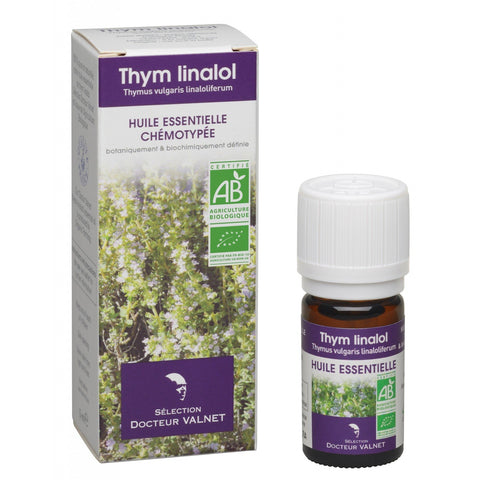
Thyme with linalool Bio-5 ml-Dr.Valnet
Remaining stock : 10


Thyme linalool essential oil
Discover the essential oil Thyme with linalool Bio, 5 ml from Dr.Valnet.
Why use Dr. Valnet's Thyme Linalool essential oil?
Main therapeutic properties and indications
Anti-infectious, antibacterial - Antifungal, antimycotic - Antiparasitic - Antiviral - Mild immunostimulant.
It will be used, instead of other more aggressive thyme essential oils, to treat all kinds of infections in sensitive and allergic people, for children from 6 years old and for younger children, for external use.
Respiratory tract infections
Intestinal infections, candida albicans, parasites, viruses…
Urinary and vaginal infections for susceptible people
Thyme linalool essential oil is an excellent dewormer for children, gentle and very effective.
Also for sensitive people and children, it is used to fight against viral infections, angina and flu for example and to stimulate the defense system of a tired body.
How to use Dr. Valnet's Linalool Thyme essential oil?
The mildness of Linalool Thyme (or Red Thyme) essential oil makes it particularly recommended for children and the elderly for its tonic and antiseptic properties. This essential oil must still be diluted for cutaneous application and diffusion.
Skin application
If applying to a large area, dilute to 20% in a vegetable oil (20% essential oil in 80% vegetable oil).
In broadcast
Linalool Thyme essential oil should not be diffused pure; it must be diluted between 5 and 10% in other essential oils.
What is Dr. Valnet's Linalool Thyme essential oil?
Thymus vulgaris linaloliferum
(Lamiaceae family)
Some notions of botany
Thyme is a very hardy, sun-loving, aromatic shrub that grows wild on the arid, rocky hills of the Mediterranean region. Thymus vulgaris is one of 300 different species of thyme. It includes several chemotypes, which is why the name of the main molecule is always added.
Linalool thyme is renowned for its mildness, pleasant, sweet scent and exceptional skin tolerance.
A little history…
The name "thyme" is borrowed from the Latin thymus, itself a transcription of the Greek thumon. This designated a type of savory and the word probably belongs to the thuos family, both offering (which is burned and produces smoke) and perfume, due to the pleasant smell that the plant gives off naturally or when burned.
The Egyptians and Etruscans used thyme mixed with ointments to embalm the dead.
The Greeks burned it in public squares as an offering to their gods, and in wealthy homes. It was highly prized as a flavoring for food and as a stimulating perfume for the body.
Dr. Valnet's Linalool Thyme Essential Oil: Technical Sheet
|
Distilled part |
aerial parts (flowering branches) |
|
Chemotype |
linalool |
|
Distillation |
to low pressure water vapor |
|
Origin |
Spain |
|
Yield |
140 kg for 1 kg of HE |

We clean up after ourselves.
Ecommerce deliveries have a carbon footprint. That's why we support verified projects that remove carbon from the air.



Every delivery’s carbon footprint is calculated based on weight, shipping method, and distance traveled. We neutralize these emissions by purchasing verified carbon removal credits from groundbreaking projects.



With your purchase, you’ll join a community of proactive merchants and customers dedicated to a sustainable future. Together, we've removed emissions for over 74 million deliveries and removed over 52 thousand tonnes of carbon.

We work with a network of pioneering carbon removal companies that have been vetted by the commerce platform Shopify.

